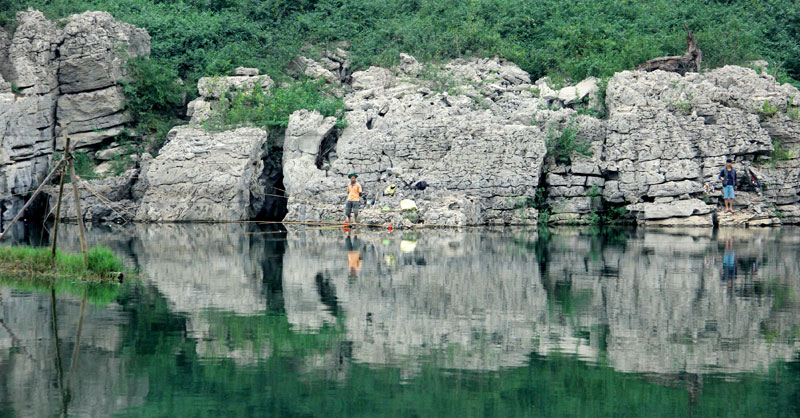



The poetic landscape of Trung Hoa commune
(Tan Lac) is a good advantage for the development of ecotourism in association with
the ethnic cultural identity.
Ngoi Hoa commune is the target of many
investment enterprises in tourism industry to run business. Ngoi village is a
long-standing village of Muong ethnic people, to be considered as one of the
most beautiful and primitive lakeside hamlet in the province. Ngoi Hoa Bay, Hoa
Tien Cave, Tien Lake, the beautiful and attractive primitive areas, wild
natural sceneries make an opportunity to build tourism products to meet the
needs of tourists.
Trung Hoa is a commune located in the
lakeside with many hamlets and villages preserving ethnic cultural identity.
The commune has wild natural landscapes, white limestone mountains full of
enchanting. Especially, there is a blue lake in the mountains, the scenery is
very poetic; all of which has made a good opportunity to exploit the
development of ecological and identity tourism, community – based tourism.
Hoa Binh Lake tourism development is a focus
of tourism development orientation of Tan Lac district. The district is
launching a project to preserve Muong ethnic cultural identity in association
with the development of a community tourism site in Ngoi village, Ngoi Hoa
commune. At the same time, the district has also concentrated on supporting the
investors to clear the surface of 435 Road (Binh Thanh - Thung Nai - Ngoi Hoa).
The province has agreed to invest in the road construction to Hoa Tien Cave
(Ngoi Hoa), connecting from Ngoi village to Ba Khan, towards to the entrance of
Hoa Tien Cave. When this route is put into operation, it will meet the
exploitation need of Hoa Tien Cave national scenic spot. The Department of Culture,
Sports and Tourism has investigated to build the road route from Ngoi Hoa -
Trung Hoa - Phu Vinh - Ba Khan (Mai Chau). In the first 6 months of 2018, the
district opened a training course of exploiting community homestay tourism
business for 30 households. The tourism activities have initially been
delighted, the number of tourists and the amount of tourism revenue have been
improved. In 2017, the total number of visitors to the district was 94.6
thousand people, which has increased by 12 thousand visitors compared with the
previous year, the tourism revenue reached at 10.9 billion VND, the income from
tourism reached at 17.7 billion VND. In the first six months of 2018, Tan Lac
district has been greeting 76 thousand visitors.